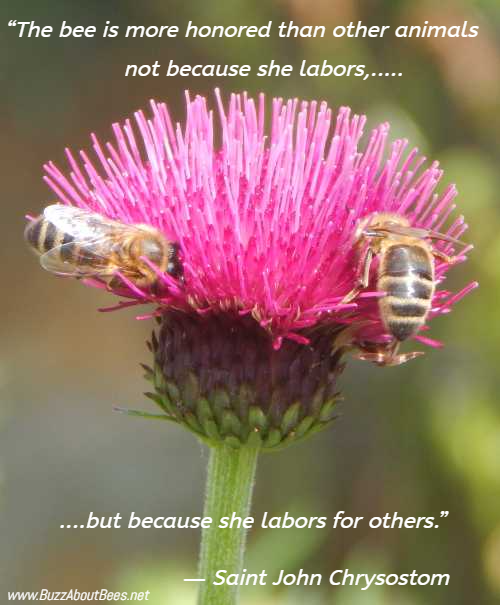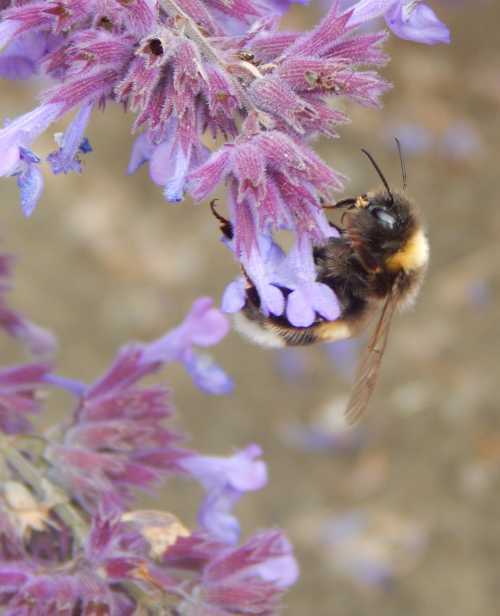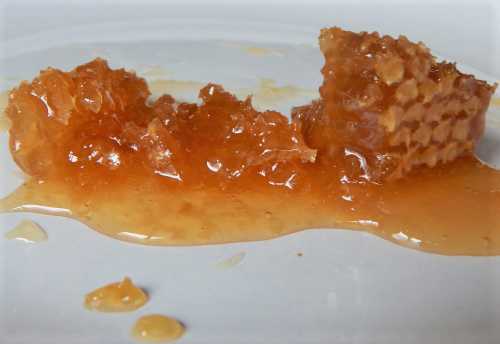What Do Bees Symbolize?
Since ancient times, bees - especially honey bees, have been seen to symbolise industry, to bring messages from the Divine, to set an example, to be associated with the soul, and to bring the blessing of fertility.
Symbolism And Bees
Indeed, images of honey bees and their hives are present on ancient artefacts associated with goddesses, religions, and ancient cities. Bees also appear in religious texts.
Here's a snapshot of the meaning of bees from ancient civilizations to more recent times. (Also see: The meaning of bees in dreams).
1. Industry And Strong Work Ethic
Bees are often associated with hard work, being busy, and with industry (productivity).
Many expressions are in use, such as 'a hive of activity', and 'busy as a bee'. Metaphors and similes that include bees in such a way, are found in poetry and literature.
Here are a few examples of the use of bees to symbolise industry:
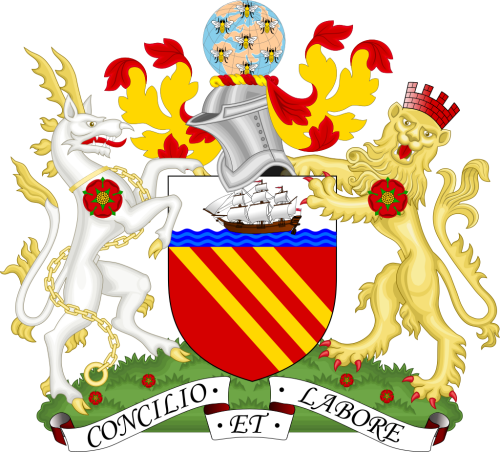 Above: The coat of arms of Manchester City council since 1842 features bees.
Above: The coat of arms of Manchester City council since 1842 features bees.City Of Manchester
Manchester, an industrial city in England, has long had the honey bee as a symbol of hard work and industry.
At the beginning of the Industrial Revolution which began in England, Manchester was a producer of cotton textiles.
It has been a city associated with industry ever since, and many of Manchester's old buildings, such as the town hall and its clock feature images of bees.
In the above picture of the Manchester city coat of arms, 7 bees are flying over a globe at the very top of the crest. The bees are said to symbolise Manchester's industry being exported across the world.
At the foot of the coat of arms is the city's Latin motto: Concilio Et Labore, which loosely translates as: "by wisdom and effort" or "by counsel and work".
Sir William Dugdale
On the day of the birth of Sir William Dugdale (an English antiquary born 1605, died 1686), a swarm of bees entered his father's garden. His father took this as a sign that it "esteemed some happy presage on behalf of the Babe".
The astrologer, William Lilly, later told William's father that the bees "did foretell that the infant should in time prove a prodigy of industry", which indeed he was, producing many notable papers, books and surveys in his time.
Corpus Christi College
Corpus Christi College (full name: The President and Scholars of the College of Corpus Christi in the University of Oxford) is one of the colleges of the world famous Oxford University.
It has a number of animal totems, including the pelican, fox and bees. The bees are a reference to the founder's stated desire to create an
institution that would be a "hive of [scholarly] activity".
2. Association With Fertility
In Hinduism, the Rig Veda tells how Vishnu created a spring from one of his footprints.
From the spring flowed mead, which bestowed fertility upon those who drank from it.
3. Bees And The Ancient Greeks
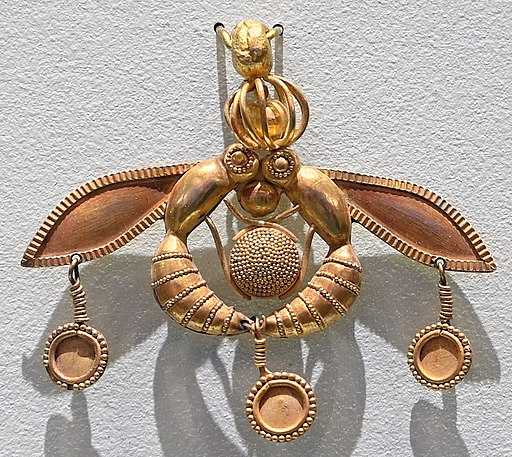 A Minoan gold bee pendant
A Minoan gold bee pendantThe above pendant can be viewed at the Archaeological Museum of Heraklion
Bee Pendant Credit: Cayambe, CC BY-SA 4.0, via Wikimedia Commons
Bees were certainly revered by the ancient Greeks, and bees appear frequently in mythology.
Plato
It is said that when the philosopher Plato was in his cradle, a swarm of bees alighted on his mouth.
Pindar
A poet of Ancient Greece, Pindar, is said to have been nourished by bees with honey instead of milk.
Pythagorus
The Greek philosopher Pythagorus believed that the souls of the wise and ingenious passed into the bodies of bees1.
4. Bees And The Ancient Romans
Jupiter for the ancient Romans was the equivalent of the god Zeus for the Greeks. The Romans believed Jupiter was nourished by bees in infancy.
5. The Soul And Divine Message
It's interesting how, according to some traditions, bees were associated with Divine or 'other world' messages, the soul, and heaven.
The Celts and Saxons believed bees were winged messengers between worlds, whilst Egyptians thought the bee represented Ka (the soul). According to Egyptian mythology, when the god Re cried, his tears turned into bees upon touching the ground, to deliver messages to man.
In European folklore, it was believed that bees and eagles were the only members of the animal kingdom with access to heaven.
6. Bees And Christianity
There are a number of patron saints of bees.
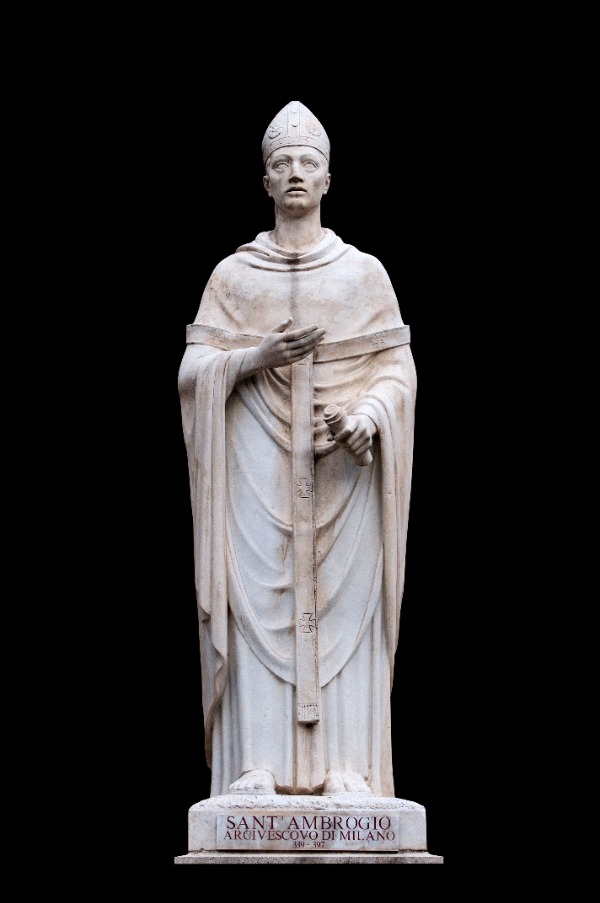 Saint Ambrose - Aurelius Ambrosius
Saint Ambrose - Aurelius AmbrosiusSaint Ambrose
Aurelius Ambrosius (c. 340 – 397), was a bishop of Milan who became one of the most influential ecclesiastical figures of the 4th century.
There is a legend that as an infant, a swarm of bees settled on his face while he lay in his cradle, leaving behind a drop of honey. His father considered this to be a sign of his future eloquence and 'honeyed tongue'.
For this reason, bees and beehives often appear in the saint's symbology.
Appointment of a Pope
In 1623, a swarm of bees flew into the Vatican just as the conclave of cardinals were choosing a new pope.
The bees alighted on the chamber where Maffeo Barberini awaited the outcome of the election. The Barberini family crest features three bees. Maffeo was appointed pope.
Afterwards, the election was said by Romans to have been foretold by the swarm of bees entering the conclave2.
The three bees were subsequently incorporated into Rome's architecture and monuments.
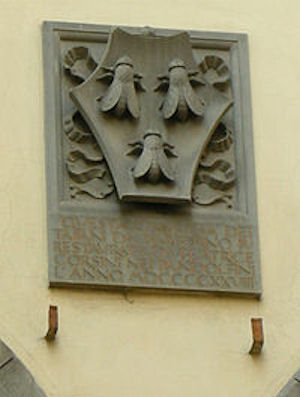 The three bees of the Barberini coat of arms have been incorporated into architecture in Rome - source - Wikipedia Commons.
The three bees of the Barberini coat of arms have been incorporated into architecture in Rome - source - Wikipedia Commons.Bees in the Bible
Bees and honey often appear in The Bible. The Bible is rich in symbolism, and references refer to the the use of bees to 'drive away' foes, and honey as a symbol of abundance and reward.
An interesting reference to bees and honey occurs in Judges and details the story of Samson and the honey from the lion.
7. Bees In The Quran
Bees feature in the Quran and receive direct instruction from God.
8. Bees In Judaism
Bees are mentioned in the Torah and honey is used in a number of Jewish customs, such as Rosh Hashanah. See Bees In Judaism.
Also see:
Resources
1. Bee by Claire Preston, Published 2006, Reaktion Books. ISBN: 9781789140484.2.
2. Rietbergen, P. J. A. N. (2006). Power And Religion in Baroque Rome: Barberini Cultural Policies. BRILL. ISBN 9789004148932; and Hunt, John M. (2016). The Vacant See in Early Modern Rome: A Social History of the Papal Interregnum. BRILL. ISBN 978-9-004-31378-1.
If you found this page helpful or interesting, I'd really be grateful if you would share it with others - if not this page, perhaps another, such as Gardening For Bees.
Thank you so much :) .
